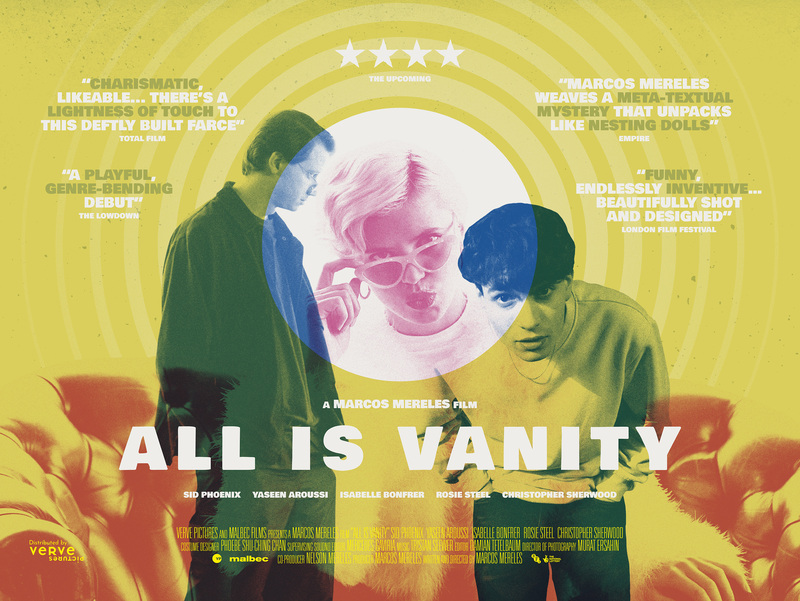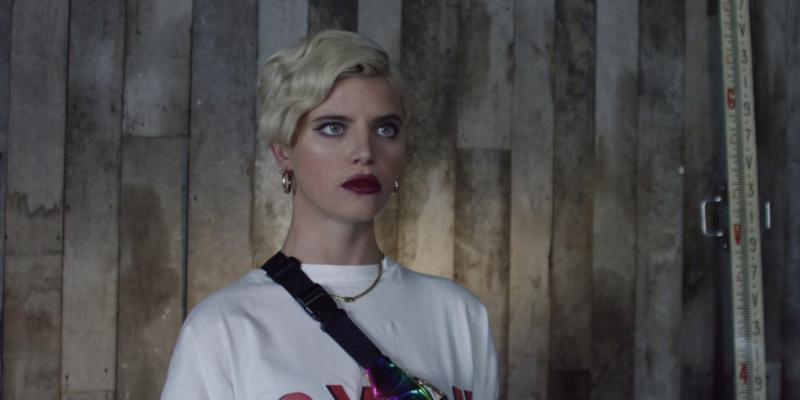
Review by
Benjamin Poole
Directed by: Marcos Mereles
Starring: Sid Phoenix, Yaseen Aroussi, Isabelle Bonfrer, Rosie Steel, Christopher
Sherwood

"All is vanity." Or, to expand the lection; "Vanity of vanities, saith the
Preacher, vanity of vanities! All is vanity." An expostulation which opens
Ecclesiastes, from the Old Testament, and instructs us how the human way
is ultimate folly against the infinite endurance of the world, which
unlike squishy mortal man, "remains forever." The scripture goes on to
remind us that novelty is disingenuous too, as "there is no new thing
under the sun." Phrase for everything in that Bible, it seems. But I
wonder if there is a cautionary holy maxim which refers to the
underwhelming production of a patchy indie drama with a gimmicky twist
which it has no idea what to do with? An equitable discussion of
All is Vanity, the just-about feature length debut of writer/director
Marcos Mereles, must involve said narrative convolution, the
revelation of which will ruin the film’s baryta thin raison d'être. So,
spoilers ahead.

All is Vanity’s so-so trickery begins with the visual language of True Crime: static
shots of empty space and portentous voiceovers tentatively alluding to
Something Bad That Happened. Flash back to a photo shoot in a cliché-chic
loft apartment of scrubbed floorboards, whitewashed walls and oversized
props. The players involved are variously placed upon the preening vacuous
nob scale, and the credits duly give each no identity beyond their role:
how ‘arch’. There is chief sneak The Photographer (Sid Phoenix),
elusive The Makeup Artist (Rosie Steel), naïve The Intern (James Aroussi) and jaded The Model (Isabelle Bonfrer).
The first half hour involves this lot being furtive to each other before
one of them eventually disappears, along with the electricity cutting out
a couple of times. It is mysterious. Mereles and cinematographer
Murat Ersahin do create a pleasingly hollow atmosphere in this
opening sequence, which pertains to the essential emptiness of most
fashion photography. Of course, this is not an especially original point
of view, but the dynamic of commercial photography, the conjuring of
superficial desire from fabricated ideals, is always an effectively spooky
impetus; "to photograph someone is a subliminal murder," etc. You do
wonder how they’re going to stretch this blatancy out for another 40 mins
or so, though...

But then in a flash it all switches and it turns out that we’ve REALLY
been watching a film which is being made about a murder during a photo
shoot in a cliché-chic loft apartment of scrubbed floorboards, etc. Ahhh,
weren’t expecting this, were we? Well, no. Because what we’ve patiently
sat through with open hearts and minds has been edited to the identifiable
rhythms of narrative cinema (not, say, ‘found footage’), as is the ensuing
meta-pull back. It’s the lazy dishonesty of spiking someone’s drink: a
point underlined by the close-up words "you’ve been poisoned" printed on
the inside bottom of a mug someone in the film drinks from. The film
doesn’t break its characteristically aloof tone either, which may be a
construction referring to the duology of photo/cinematography as a slim
reflection of indistinguishably blank subjects, or simply the only speed
All is Vanity is capable of operating at. New characters are
also christened with archetypal definers - The Film Director, etc - and
there is also an ongoing sense of mystery, which here stretches the theme
of duplication into creepy fantasy.
The initial ‘got ya’ meta refraction of All is Vanity goes
no further than equating the purposeless endeavour of photographing a
subject to the similarly fruitless enterprise of filming a narrative, and,
yes, I suppose, eventually writing about it (when the film really begins
to unravel, a film critic - The Film Critic - appears to comment on
ongoing events. He’s the type of pretentious, circumlocutory bore who
might quote Susan Sontag in a review... see, two can do this meta thing).

There are potentially interesting ideas here, but none of them are given
the necessary focal point, making the treatment as superficial as the
pursuits All is Vanity satirises. At a mercifully short 72
minutes or so, the film doesn’t so much end as disappear up its own
aperture. This eye is not satisfied with seeing (Ecclesiastes 1.8 *).

All is Vanity is in UK cinemas and
on VOD from October 14th.

